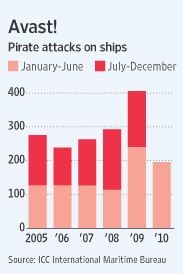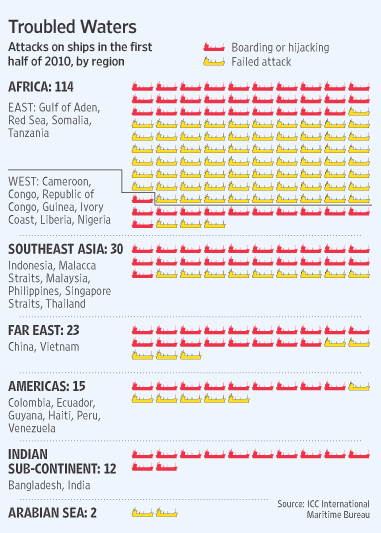- "U.S. diplomats told to send their children out of Monterrey"
CNN (August 27, 2010) - "Chief investigator of Mexico mass killings goes missing"
BBC (August 28, 2010) (It's been Saturday in the U.K. for several hours)
I discussed Mexico earlier this summer. (June 17, 2010) The bottom line is that Mexico's troubles connect with the war on terror - not because Mexicans don't look like "real Americans," but because the criminal groups who apparently control much of the country are killing people - and the violence occasionally spills over into America.
If Mexico's national government goes down the drain - a real possibility - we'll have an analog of Somalia, right across the border from California, Arizona, New Mexico and Texas. That would be a very real problem for America - and a worse one for those Mexicans who aren't involved in illegal activity.
Mexico is a serious threat to folks in other parts of the Americas, too. A CNN article discussing the missing criminal investigator (and another law enforcement official) told a little about what Mexico's chaos does to people looking for a better life:
"...Authorities have identified 31 of the 72 migrants whose bodies were found on a ranch near San Fernando, the attorney general's statement said. Of those identified, 14 came from Honduras, 12 were from El Salvador, four were from Guatemala and one from Brazil, the official said.My ancestors came to America from northwestern Europe, not Central America: but most of them had the same motive as the people murdered recently in Mexico. They weren't satisfied with the limited economic opportunities in their homelands, and thought they could do better in America.
"A young man from Ecuador who led navy personnel to the scene of the massacre said he escaped after pretending he was dead. He suffered a neck wound and remained hospitalized Friday....
"...Central American migrants traveling through Mexico on their way to the United States are often the victims of violence and other crimes.
" 'Every year, thousands of migrants are kidnapped, threatened or assaulted by members of criminal gangs,' Amnesty International said in a report this year. 'Extortion and sexual violence are widespread and many migrants go missing or are killed. Few of these abuses are reported and in most cases those responsible are never held to account.' "
(CNN (August 27, 2010))
Happily, they didn't have to walk through Mexico: so I'm here today, writing about what folks with the same dreams face today.
As for what I think of strangers moving in with their foreign ways? So far, it's meant a new selection of food in the grocery my family goes to, and some new faces in church: both of which are fine by me.
Related posts:
- "Mexico, Losing America, Getting a Grip"
(June 17, 2010) - "Falcon Lake, Texas: Sometimes Terrorists aren't 'Terrorists' "
(June 3, 2010) - "Pirates Aren't Good for Business: or, Views From Zapata, Texas"
(May 30, 2010) - "St. Rose of Lima, Decisions, and Being Catholic"
A Catholic Citizen in America (May 29, 2010) - " 'Those Immigrants,' Assumptions, and the Catholic Church"
A Catholic Citizen in America (May 18, 2010) - "Holiday Inn Raid in Monterrey, Mexico? What Raid?"
(April 24, 2010) - "Raid on Monterrey, Mexico, Holiday Inn: Bad News, But That's about All We Know"
(April 21, 2010) - "The 90% Solution: American Guns, Mexican Raids, and Common Sense"
(April 2, 2009) - "Pakistan and Mexico Collapse Possible: Why I'm Glad Somebody Else is President"
(January 14, 2009) - "Committee to Protect Journalists Unveils the Impunity Index"
(April 30, 2008)
- "U.S. diplomats told to send their children out of Monterrey"
CNN (August 27, 2010) - "Chief investigator of Mexico mass killings goes missing"
BBC (August 28, 2010) (It's been Saturday in the U.K. for several hours) - "Lead investigator in Mexico massacre is missing"
CNN (August 27, 2010)


